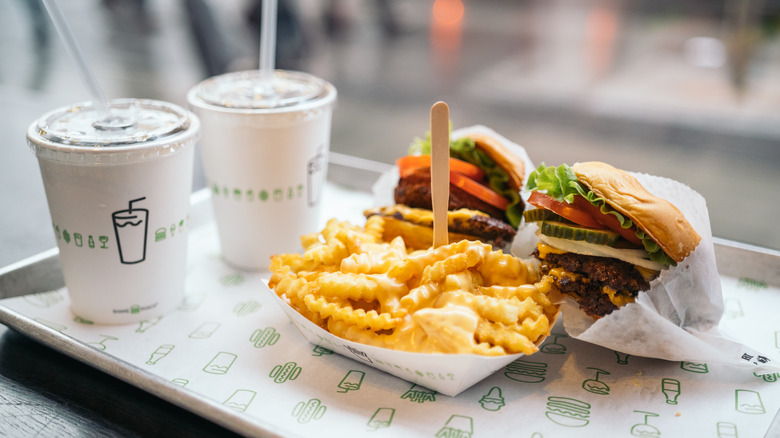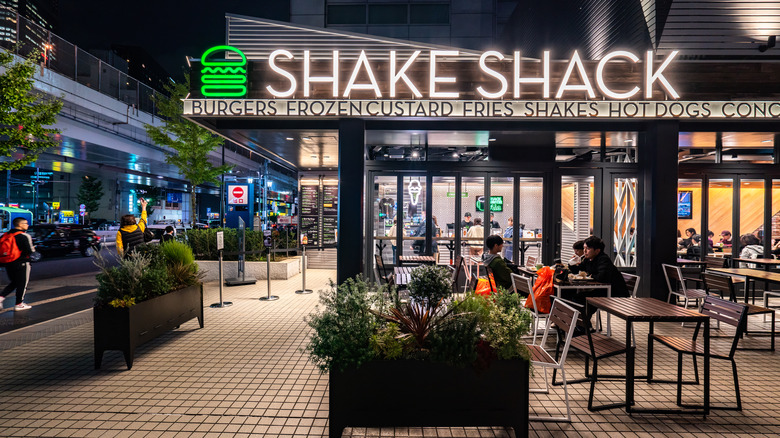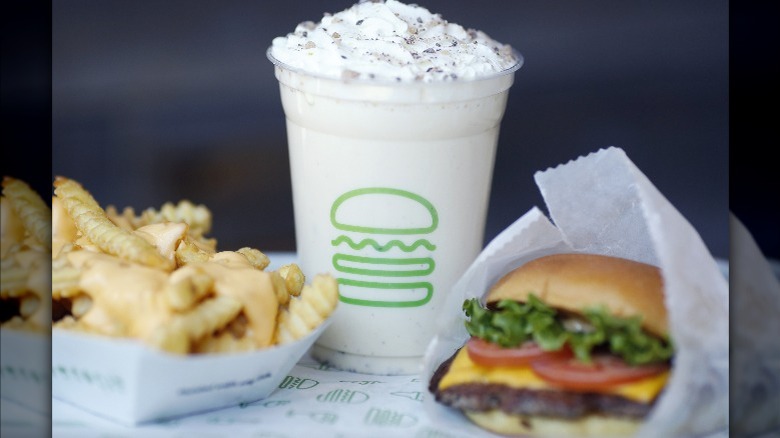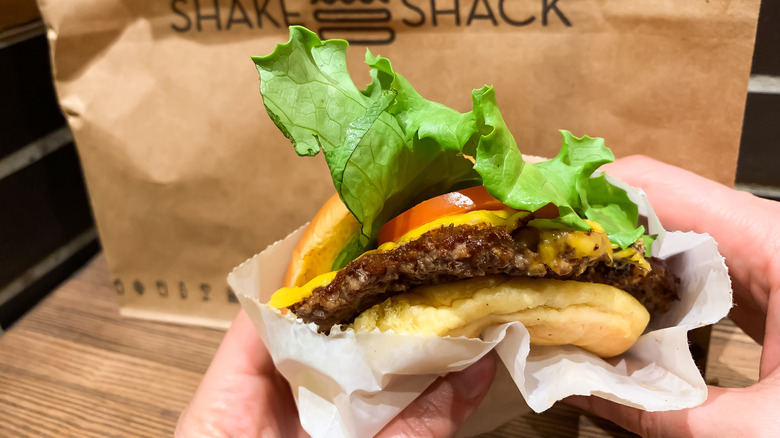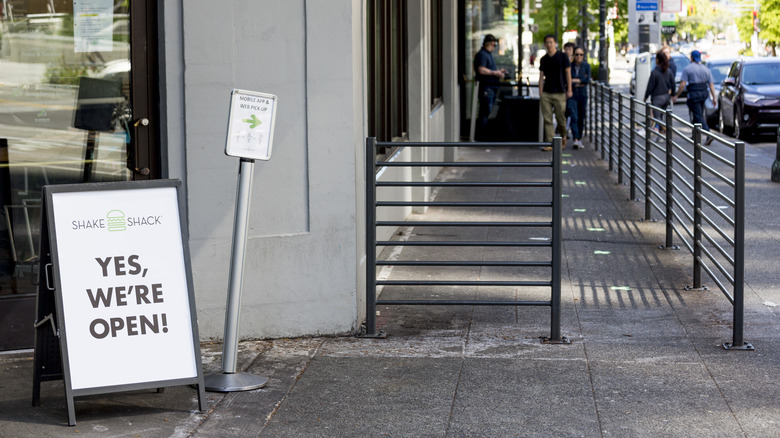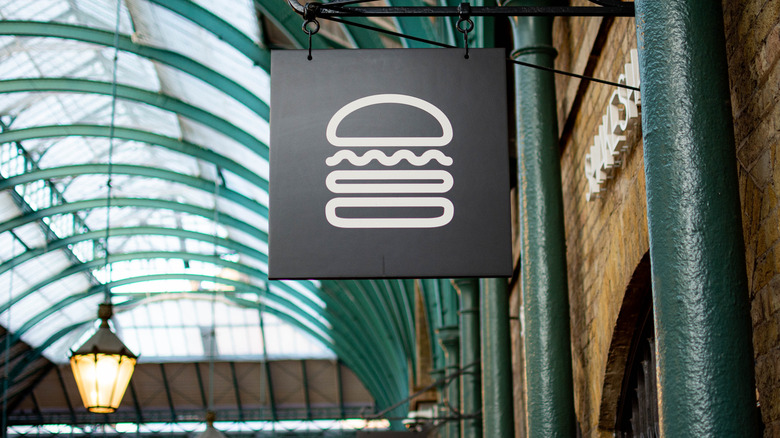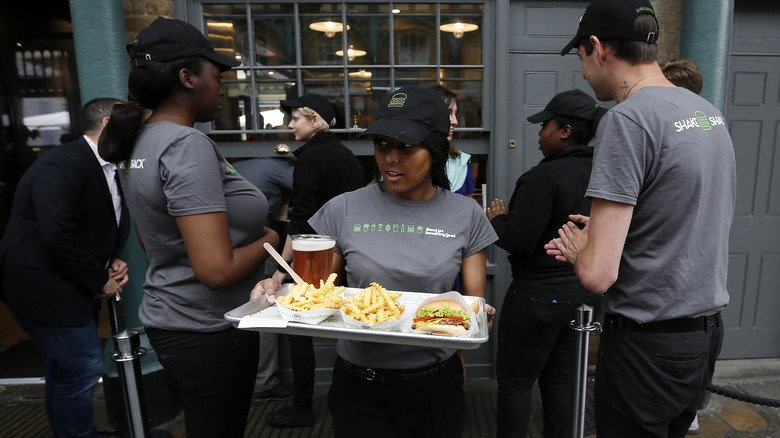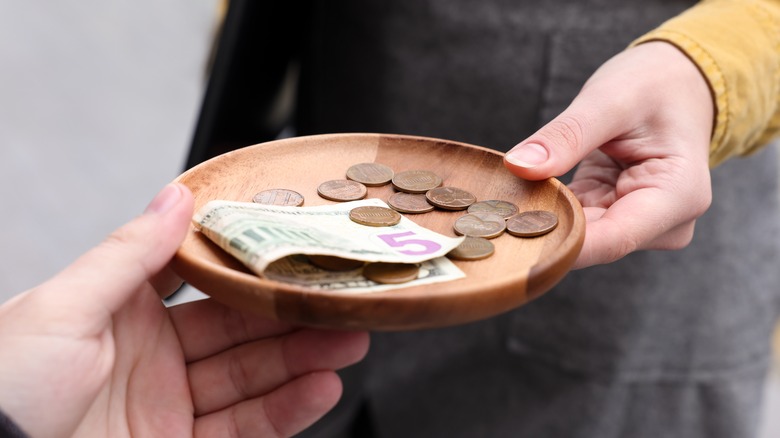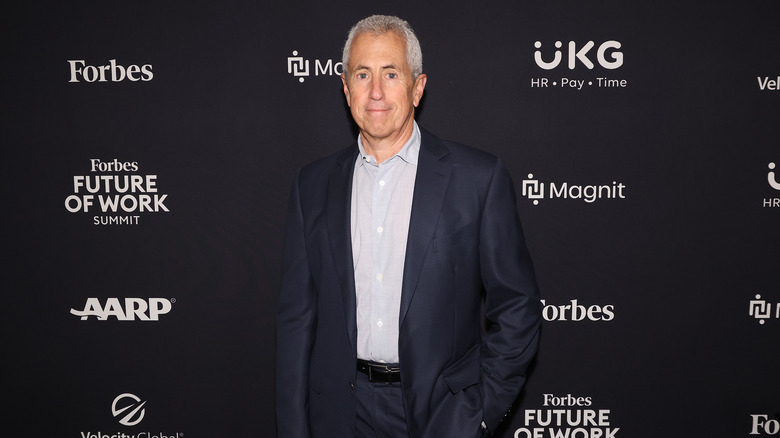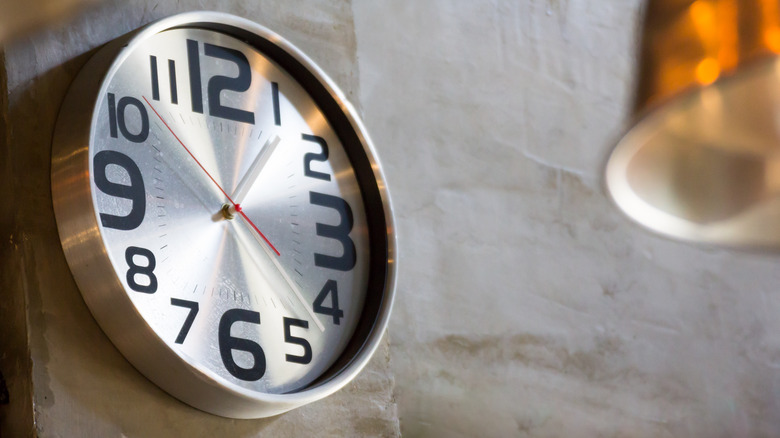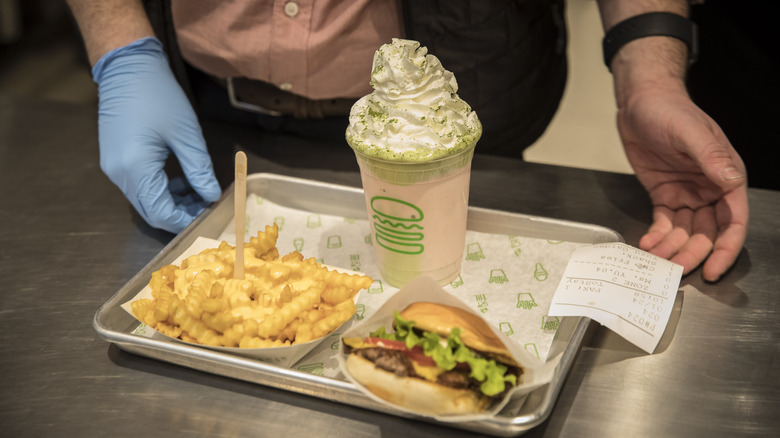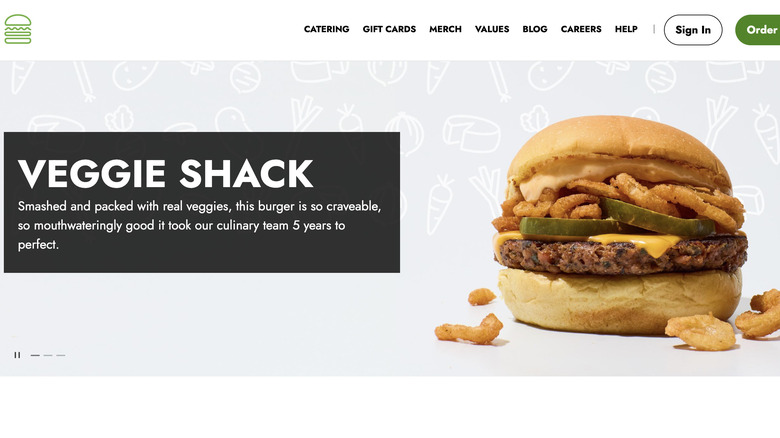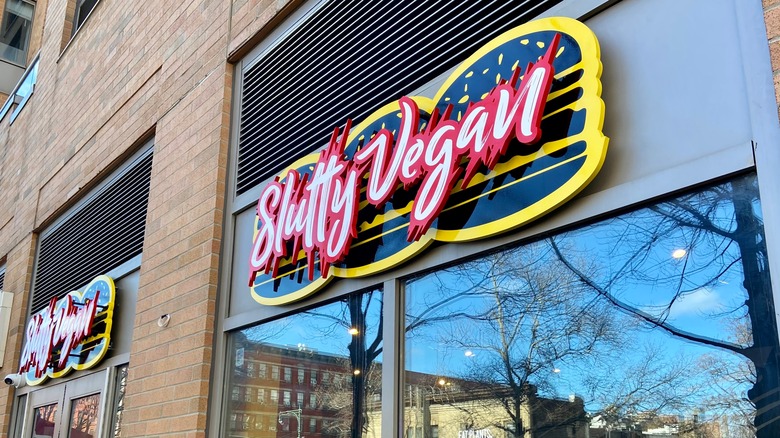The Biggest Scandals In Shake Shack History
Born as a humble hot dog stand in 2001, Shake Shack, as we know it, had its beginnings three years later when the cart was converted into a kiosk. Notably, the chain's founder Danny Meyer and CEO Randy Garutti immortalized their ideas for the first Shake Shack restaurant on a napkin, capturing the essence of what would become an iconic presence on America's fast food dining scene. It wasn't long before the chain was winning over the taste buds of burger enthusiasts worldwide. Today, Shake Shack has close to 300 locations in the U.S. and over 115 outlets across the globe.
While over the years Shake Shack has grown into a beloved staple for fast food lovers, appearances can be deceiving. Just like with any fast food empire, the chain has been involved in its fair share of sticky situations and even scandals. Some of these controversies have been justified and deserving of scrutiny, while others might have been blown out of proportion — the final judgment is in your hands.
From contentious labor practice disputes to food safety concerns, here are some of the biggest scandals in Shake Shack's history. Enjoy the ride!
It was hit with a discrimination lawsuit for repeated misgendering
A lack of a safe, comfortable, and convivial working environment can break the best of us. It can also have consequences for fast food restaurants, and we aren't just talking about high employee turnover rates. In February 2023, Shake Shack was ordered to pay a $20,000 settlement for condoning the repeated misgendering of a former employee who worked at the chain's Oakland, California branch (via TODAY.com).
The complaint, which was investigated by California's Civil Rights Department, alleged that the individual experienced "discrimination, harassment and retaliation based on his gender identity and gender expression." More specifically, the individual, who brought the issue to the attention of the restaurant's management, was told that "he would have to explain his gender to co-workers." Frustrated by the management's failure to take action, the former employee quit after a month on the job.
In addition to compensating the ex-worker, Shake Shack has also promised to revise its policies in relation to harassment, discrimination, bullying, and retaliation to prevent similar incidents from occurring in the future. "Creating a welcoming and fulfilling environment for all our employees and guests is critical. We are constantly taking steps to ensure our policies and culture reflect our commitment to diversity and inclusion in the workplace," a Shake Shack representative said in a statement to TODAY.com.
NYPD accused Shake Shack's manager of poisoning milkshakes
Certain scandals involving fast food restaurants are so bizarre that they seem more like fiction than reality. One such case took place in June 2020, when the Police Benevolent Association and Detectives' Endowment Association accused a Shake Shack manager of poisoning three NYPD officers, as reported by the New York Post. The manager of the chain's outlet in Lower Manhattan, Marcus Gilliam — who is now suing NYPD unions for defamation — was accused of adding bleach to the police officers' shakes. In the lawsuit, Gilliam alleges that he was illegally detained by the police, during which time he was questioned and taunted about the purported incident.
According to the legal proceedings, the three officers placed their Shake Shack drink order via an app. After picking up the milkshakes, the officers complained to Gilliam that the drinks tasted strange. In addition to apologizing, Gilliam also gave the disgruntled cops vouchers for complimentary food and shakes.
Later, the officers informed their sergeant that they suspected that Gilliam had added a "toxic substance" — which they said could have been bleach — to their milkshakes (via NBC News). As a result, at least 20 police officers swarmed the Shake Shack outlet two hours following the incident, declaring it a crime scene. Investigators conducted tests on the shakes but found no evidence of any foul play or the presence of any toxic substance.
The far-right bun scandal
None of us stand alone. The same can be said for fast food chains that rely on third-party suppliers for their ingredients. In 2022, Shake Shack upset some lovers of grab-and-go meals with its choice of burger bun supplier. The backlash came after the chain's customers found out that the family behind its supplier of burger buns — Martin's Potato Rolls — donated a six-figure sum to the controversial senator Doug Mastriano. Mastriano supports several contentious political ideas, such as advocating Christian nationalist ideology and questioning the validity of the 2020 presidential election results, as reported by Billy Penn.
The last we heard, Shake Shack refused to sever ties with the bakery, despite the controversy. However, according to Billy Penn, the company doesn't have any political affiliations and is engaging in discussions with the supplier to address the concerns raised by customers. "We are aware of recent criticisms leveled against Martin's and our business partners," a Shake Shack representative said. "We will continue to focus on the values that have made our company successful — baking quality products, providing excellent service to our customers, and supporting the communities around us."
Shake Shack returned a $10 million COVID-19 relief package
COVID-19 was tough on small businesses, with many struggling to stay afloat amid the economic downturn and operational restrictions. While government stimulus packages were a crucial source of support for many, their distribution had its fair share of controversy.
As small-scale operations were closing their doors, Shake Shack took advantage of the Paycheck Protection Program (PPP) designed to help small businesses with under 500 workers weather the storm brought about by the pandemic. And while Shake Shack technically qualified for the $10 million federal loan, supporting a fast food chain with 189 restaurants in the U.S. probably wasn't what the government had in mind when offering aid to struggling small businesses.
The fact that the PPP funds were exhausted in just two weeks didn't put Shake Shack in the best light. As reported by NPR, CEO Randy Garutti called the terms of the loan "confusing," and it wasn't long before the chain's management had a change of heart. In a statement, Garutti announced that the chain would return the $10 million PPP loan to the U.S. Small Business Administration, adding that this decision was made to ensure that the funds would be made available to the restaurants in greater need.
Employees allegedly robbed a customer
Making a TikTok video at Shake Shack can get you in deep trouble — or at least that's what Theo Stokes claims. According to a recent lawsuit filed by the law firm Elk & Elk on behalf of Stokes, the Shake Shack customer was attacked and robbed by two of the chain's employees at an outlet in Cleveland in April 2022. "[It's] something that starts out as a simple trip for a burger, then turns into interaction that is a TikTok video, then turns into an hourlong holding, robbery, and assault," Stokes' attorney, Jay Kelley III, told FOX 8.
According to Stokes, the chain's employees let him and his friends access the cash register and grill. It's unclear whether this was for the TikTok video that the friends made while at the outlet. For whatever reason, somewhere along the line, this seemingly friendly exchange turned into threats and a robbery. "Stokes was taken back and forth to the rear of the restaurant where a diamond necklace was ripped off his neck, a watch was removed, his car keys were taken, cell phone taken, and wallet and contents taken," the suit alleges. While Stokes' car was also allegedly taken, it was eventually returned to its rightful owner.
It was embroiled in an overtime pay dispute
When we work extra hours, we hope to receive appropriate recognition and compensation for our efforts. However, according to nine former and current New York City Shake Shack managers, this isn't always the case. In 2021, the employees brought a class action against the fast food chain, claiming that they weren't fairly rewarded for the extra hours they worked over their set 40-hour work week. The managers were asking for compensation of $50 for each week they didn't receive adequate overtime payment. This amounted to $2,500 each, as reported by DNAinfo.
While Shake Shack settled the suit by paying each manager the desired amount, the chain said that it did so for tactical reasons. "We made a strategic decision to settle the allegation, despite our position on it, in order to keep our focus on building our business, growing our terrific team and offering the best experience possible to our guests," it said in a statement.
Its no tipping policy backfired
Shake Shack's founder Danny Meyer is well known for his stance on tipping. "Tipping is one of the biggest hoaxes pulled on an entire culture," he once said, as per Business Insider. Meyer also went on to say that the practice of tipping is historically associated with racism and slavery. However, the Shake Shack boss got more than he bargained for after a number of the chain's outlets dropped tipping in 2015 — a move that led to higher menu prices, which were supposed to bolster employee wages.
To many, it came as no surprise that things went pear-shaped. As reported by The Counter, in 2017, Danny Meyer and his Union Square Hospitality Group — as well as a number of other restaurants — were accused of "unlawfully transfer[ing] millions of dollars from customers and servers to restaurant owners in violation of federal and state antitrust laws."
The lawsuit, which was initiated by a diner, alleged that the restaurants' prices went up by more than the lost tips. As reported by Business Insider, the lawsuit stated: "Persons overcharged as a result of a price-fixing conspiracy are entitled to recover triple their damages plus costs and reasonable attorney's fees. Injured servers and other customarily-tipped employees may also have a viable claim for treble damages." Make of it what you will, but the action was dismissed in 2019, with the judge implying that making a price-fixing case against a limited number of restaurants is just too challenging (via FindLaw).
The company's founder found himself in hot water after allegations of improper tip distribution
In 2017, Danny Meyer's Union Square Hospitality Group had to pay $700,000 to settle a class action filed by Uzzol Siddiky and Kawsar Maruf, two former bussers at Gramercy Tavern, which is a part of the group's collection of restaurants (via Gothamist). The ex-employees claimed that the tips they received from customers were shared with staff members who weren't directly involved in customer service. More specifically, the bussers alleged that they had to share their tips with workers on higher hourly wages — the bussers were earning $5 per hour while the minimum wage was $8.75 per hour.
The six-figure sum was divided between 220 workers employed by the hospitality group, with $150,000 of the $700,000 allocated to cover lawyer expenses, as reported by the New York Post. The Union Square Hospitality Group promised to look into the matter, stating (per Gothamist), "We have always cared deeply about cultivating a strong employee‐first culture, and we will review this matter thoroughly." Shortly after, the group replaced its traditional tipping model with a gratuities-included model. This change resulted in price hikes at Shake Shack restaurants, leading to backlash from the chain's customers.
Shake Shack employee scheduling debacle
We all know that there is something fishy about a big fast-food chain that agrees to pay out a $6 million settlement — yet doesn't admit to any wrongdoing. Well, this is precisely what Shake Shack did in 2022 when the fast food chain agreed to pay out a seven-figure settlement for not offering its employees "consistent and lawful schedules," as per Top Class Actions.
The settlement applied to all hourly employees of the Shake Shack store in New York City who worked at the outlet between January 1, 2019, and March 3, 2022. The class action asserted that the chain's practices breached the provisions of the New York City Fair Workweek Law. This law stipulates that fast-food employers are required to provide their employees with consistent work schedules at least two weeks ahead of time. The settlement was apportioned in accordance with the period of employment of each hourly Shake Shack worker (via Class Action Reporter).
It allowed sick employees to work with food
We're all familiar with that uncomfortable feeling when we're handed food by a server who is clearly unwell. Not only is it an unpleasant experience for the customer, but it also brings up concerns about the hygiene of the food being served and the establishment as a whole. In 2017, one former Shake Shack employee took matters into his own hands by suing the burger chain for its purportedly haphazard approach to food safety, including allowing "visibly sick" employees to come in contact with food (via the New York Post).
Derrick Via, who worked at the Fulton Transit Center Shake Shack in Manhattan until 2017, sued the fast food giant for $1 million for failing to address various food safety issues in the workplace. Via also alleged that he was fired after bringing his concerns to the attention of the management. Some of the issues listed in Via's lawsuit included failure to provide employees with training about food allergies, allowing ill workers to prepare food, and inadequate in-house cleaning processes.
According to Shake Shack, Via was given his marching orders for "stealing" his co-worker's phone. Via, in response, said that he returned the phone to its rightful owner on the same day. He had removed it from the customers' line of sight in the store, in accordance with the chain's policy. It appears that Via's attempt to sue Shake Shack was unsuccessful since his claim ended up being voluntarily dismissed, as per PacerMonitor.
It was sued over the accessibility of its website
Up to June 2017, the Americans with Disabilities Act (ADA) — which makes discrimination on the basis of disability in the "public sphere" illegal — was usually only applied to establishments with physical locations. This, however, changed when a federal judge opened the floodgates by holding the supermarket chain Winn-Dixie in breach of the ADA for failing to make its website accessible to visually impaired individuals (via MSF).
It wasn't long before numerous restaurants and retailers faced lawsuits, with Shake Shack being one of the companies that found itself in hot water, as reported by ClassAction.org. The claim against the burger giant alleged that ShakeShack.com couldn't be used with screen reading apps, making it impossible for blind users to access information on the platform. Shake Shack has since addressed this issue, and its website is now fully compliant with all ADA requirements, as reported by the company.
Slutty Vegan was sued for inadequate employee payments
Okay, so Slutty Vegan isn't exactly Shake Shack. However, since the restaurant chain is backed by Danny Meyer, the head honcho behind Shake Shack, we thought that its legal troubles were definitely worth a mention. Masterminded by an ex-television producer, Pinky Cole, the popular plant-based burger chain first opened its doors five years ago in 2018.
Fast forward to April 2023 and Slutty Vegan's Brooklyn location found itself under fire from three disgruntled workers. According to Business Insider, the employees were asking for over $150,000 as compensation for breach of contract, as well as non-compliance with New York and federal laws. More specifically, the lawsuit alleges that the restaurant's management botched the calculation of its employees' salaries, failed to pay their bonuses, and didn't pay them for overtime. One of the claimants alleges that he was forced to pay to have his Shake Shack uniform shirts laundered at least twice per week since he was only ever given two shirts. This happened despite him working more than 40 hours per week. As of this writing, the lawsuit is still ongoing.
